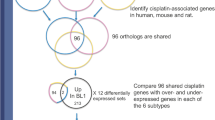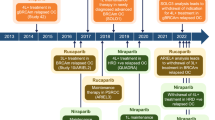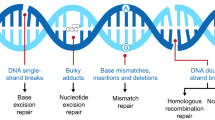Opinion statement
As we come to better understand cancer genomics, we are increasingly shifting towards precision medicine. FGFR has been elucidated as one of the oncogenic driver pathways in urothelial carcinoma, leading to exciting targeted drug development. Although many agents are being investigated, erdafitinib is the only FGFR inhibitor currently approved by the FDA for treating platinum-refractory metastatic urothelial carcinoma harboring susceptible FGFR2/3 alterations, with seemingly higher response rates than second-line chemotherapy or immunotherapy. In this review, we summarize the clinical data supporting FGFR inhibition, ways to optimize its use in routine clinical practice including FGFR testing, dosing, and toxicity management. We also highlight ongoing efforts evaluating combination strategies and testing in earlier treatment settings to further expand this targeted therapeutic approach in urothelial carcinoma.
Similar content being viewed by others
References and Recommended Reading
Papers of particular interest, published recently, have been highlighted as: • Of importance •• Of major importance
Bouffioux CR. Epidemiology of bladder cancer. Prog Clin Biol Res. 1984;162 A.
Siegel RL, Miller KD, Fuchs HE, Jemal A. Cancer statistics, 2021. CA Cancer J Clin. 2021;71(1).
Jiang DM, Chung P, Kulkarni GS, Sridhar SS. Trimodality therapy for muscle-invasive bladder cancer: recent advances and unanswered questions. Curr Oncol Rep. 2020;22(2):14.
Survival rates for bladder cancer[Internet]. American Cancer Society; March 1 2022 [cited June 18 2022]. Available from: https://www.cancer.org/cancer/bladder-cancer/detection-diagnosis-staging/survival-rates.html.
Cathomas R, Lorch A, Bruins HM, Compérat EM, Cowan NC, Efstathiou JA, et al. The 2021 updated European Association of Urology guidelines on metastatic urothelial carcinoma. Eur Urol. 2022;81(1):95–103.
Witjes JA, Babjuk M, Bellmunt J, Bruins HM, De Reijke TM, De Santis M, et al. EAU-ESMO consensus statements on the management of advanced and variant bladder cancer—an international collaborative multistakeholder effort†. Eur Urol. 2020;77(2):223–50.
Flaig TW, Spiess PE, Agarwal N, Bangs R, Boorjian SA, Buyyounouski MK, et al. Bladder cancer, version 3.2020, NCCN clinical practice guidelines in oncology. J Natl Compr Cancer Netw. 2020;18(3):329–54.
Milowsky MI, Rumble RB, Booth CM, Gilligan T, Eapen LJ, Hauke RJ, et al. Guideline on muscle-invasive and metastatic bladder cancer (European Association of Urology guideline): American Society of Clinical Oncology clinical practice guideline endorsement. J Clin Oncol. 2016;34(16):1945–52.
von der Maase H, Hansen SW, Roberts JT, Dogliotti L, Oliver T, Moore MJ, et al. Gemcitabine and cisplatin versus methotrexate, vinblastine, doxorubicin, and cisplatin in advanced or metastatic bladder cancer: results of a large, randomized, multinational, multicenter, phase III study. J Clin Oncol. 2000;18(17):3068–77.
Kwon W-A, Seo HK. Optimizing frontline therapy in advanced urothelial cancer. Transl Androl Urol. 2020;9(3):983–5.
•• Powles T, Park SH, Voog E, Caserta C, Valderrama BP, Gurney H, et al. Avelumab maintenance therapy for advanced or metastatic urothelial carcinoma. N Engl J Med. 2020;383(13):1218–30. This reference is of outstanding importance because it is the phase III trial that showed survival benefit with maintenance avelumab, establishing this regimen as the new standard of care first-line treatment for metastatic urothelial carcinoma.
Krook MA, Reeser JW, Ernst G, Barker H, Wilberding M, Li G, et al. Fibroblast growth factor receptors in cancer: genetic alterations, diagnostics, therapeutic targets and mechanisms of resistance. Br J Cancer. 2021;124(5):880–92.
• Weaver A, Bossaer JB. Fibroblast growth factor receptor (FGFR) inhibitors: a review of a novel therapeutic class. J Oncol Pharm Pract. 2021;27(3):702–10. This reference is of importance because it reviews how FGFR alterations lead to oncogenesis and summarizes key trials leading to FDA approval of erdafitinib and pemigatinib.
Katoh M. Fibroblast growth factor receptors as treatment targets in clinical oncology. Nat Rev Clin Oncol. 2019;16(2):105–22.
Lenis AT, Lec PM, Chamie K, MSHS M. Bladder cancer. JAMA. 2020;324(19):1980.
Nauseef JT, Villamar DM, Lebenthal J, Vlachostergios PJ, Tagawa ST. An evaluation of the efficacy and safety of erdafitinib for the treatment of bladder cancer. Expert Opin Pharmacother. 2020;21(8):863–70.
Roubal K, Myint ZW, Kolesar JM. Erdafitinib: a novel therapy for FGFR-mutated urothelial cancer. Am J Heal Pharm. 2020;77(5):346–51.
Kim YS, Kim K, Kwon G-Y, Lee SJ, Park SH. Fibroblast growth factor receptor 3 (FGFR3) aberrations in muscle-invasive urothelial carcinoma. BMC Urol. 2018;18(1):68.
Schuler M, Cho BC, Sayehli CM, Navarro A, Soo RA, Richly H, et al. Rogaratinib in patients with advanced cancers selected by FGFR mRNA expression: a phase 1 dose-escalation and dose-expansion study. Lancet Oncol. 2019;20(10):1454–66.
Tabernero J, Bahleda R, Dienstmann R, Infante JR, Mita A, Italiano A, et al. Phase I dose-escalation study of JNJ-42756493, an oral pan-fibroblast growth factor receptor inhibitor, in patients with advanced solid tumors. J Clin Oncol. 2015;33(30):3401–8.
•• Bahleda R, Italiano A, Hierro C, Mita A, Cervantes A, Chan N, et al. Multicenter phase I study of erdafitinib (JNJ-42756493), oral pan-fibroblast growth factor receptor inhibitor, in patients with advanced or refractory solid tumors. Clin Cancer Res. 2019;25(16):4888–97. This reference is of outstanding importance because it is the phase I trial that established serum phosphate level is a reasonable surrogate for efficacy and safety of erdafitinib. This is also the study that showed higher response rates with continuous dosing over intermittent dosing of erdafitinib.
Highlights of prescribing information [Internet]. U.S. Food and Drug Administration; Apr 1 2019 [cited June 18 2022]. Available from: https://www.accessdata.fda.gov/drugsatfda_docs/label/2019/212018s000lbl.pdf.
Product monograph including patient medication information [Internet]. Janssen Inc; Nov 19 2019 [cited June 18 2022] Available from: https://pdf.hres.ca/dpd_pm/00063651.PDF.
•• Loriot Y, Necchi A, Park SH, Garcia-Donas J, Huddart R, Burgess E, et al. Erdafitinib in locally advanced or metastatic urothelial carcinoma. N Engl J Med. 2019;381(4):338–48. This reference is of outstanding importance because it is the phase II BLC2001 trial that showed impressive overall response rates of erdafitinib for platinum-refractory metastatic urothelial carcinoma, leading to accelerated FDA apprival of the drug.
•• Siefker-Radtke AO, Necchi A, Park SH, García-Donas J, Huddart RA, Burgess EF, et al. Efficacy and safety of erdafitinib in patients with locally advanced or metastatic urothelial carcinoma: long-term follow-up of a phase 2 study. Lancet Oncol. 2022;23(2):248–58. This reference is of outstanding importance because it is the extended follow-up of the phase II BLC2001 trial showing no new safety concerns for erdafitinib and confirming persistent benefit in efficacy.
Milowsky MI, Dittrich C, Duran Martinez I, Jagdev S, Millard FE, Sweeney C, et al. Final results of a multicenter, open-label phase II trial of dovitinib (TKI258) in patients with advanced urothelial carcinoma with either mutated or nonmutated FGFR3. J Clin Oncol. 2013;31(6_suppl):255–255.
Kacew A, Sweis RF. FGFR3 alterations in the era of immunotherapy for urothelial bladder cancer. Front Immunol. 2020;11:575258.
Javle M, Roychowdhury S, Kelley RK, Sadeghi S, Macarulla T, Weiss KH, et al. Infigratinib (BGJ398) in previously treated patients with advanced or metastatic cholangiocarcinoma with FGFR2 fusions or rearrangements: mature results from a multicentre, open-label, single-arm, phase 2 study. Lancet Gastroenterol Hepatol. 2021;6(10):803–15.
Pal SK, Rosenberg JE, Hoffman-Censits JH, Berger R, Quinn DI, Galsky MD, et al. Efficacy of BGJ398, a fibroblast growth factor receptor 1–3 inhibitor, in patients with previously treated advanced urothelial carcinoma with FGFR3 alterations. Cancer Discov. 2018;8(7):812–21.
Lyou Y, Rosenberg JE, Hoffman-Censits J, Quinn DI, Petrylak D, Galsky M, et al. Infigratinib in early-line and salvage therapy for FGFR3-altered metastatic urothelial carcinoma. Clin Genitourin Cancer. 2022;20(1):35–42.
Lyou Y, Grivas P, Rosenberg JE, Hoffman-Censits JH, Quinn DI, Petrylak DP, et al. Infigratinib and treatment response in advanced/unresectable or metastatic urothelial carcinoma in first-line and later-line treatment settings. J Clin Oncol. 2020;38(15_suppl):5038–5038.
Quinn DI, Petrylak DP, Bellmunt J, Necchi A, Gurney H, Lee J-L, et al. FORT-1: phase II/III study of rogaratinib versus chemotherapy (CT) in patients (pts) with locally advanced or metastatic urothelial carcinoma (UC) selected based on FGFR1/3 mRNA expression. J Clin Oncol. 2020;38(6_suppl):489–489.
Zhu J. ASCO GU 2019: Fierce-21: phase II study of vofatamab, a selective inhibitor of FGFR3, as salvage therapy in metastatic urothelial carcinoma [Internet]. UROToday; Feb 14 - 16 2019 [cited June 18 2022]. Available from: https://www.urotoday.com/conference-highlights/asco-gu-2019/asco-gu-2019-penile-urethral-testicular-and-adrenal-cancers/111722-fierce-21-phase-ii-study-of-vofatamab-b-701-a-selective-inhibitor-of-fgfr3-as-salvage-therapy-in-metastatic-urothelial-carcinoma-muc.html.
Subbiah V, Iannotti NO, Gutierrez M, Smith DC, Féliz L, Lihou CF, et al. FIGHT-101, a first-in-human study of potent and selective FGFR 1-3 inhibitor pemigatinib in pan-cancer patients with FGF/FGFR alterations and advanced malignancies. Ann Oncol. 2022;33(5):522–33.
• BALVERSA — fibroblast growth factor receptor (FGFR) alterations and companion diagnostic (CDx) overview [Internet]. Janssen Scientific Affairs; Apr 22 2022 [cited June 18 2022]. Available from: https://www.janssenmd.com/balversa/clinical-use/companion-diagnostic/balversa-fibroblast-growth-factor-receptor-fgfr-alterations-and-companion-diagnostic-cdx-overview. This reference is of importance because it outlines the specific FGFR alterations that the QIAGEN therascreen assay is capable of detecting, which is also the companion diagnostic assay from BLC2001.
• Major C, Wang S. Analytical concordance of 3 independent diagnostic assays for the detection of FGFR alterations in urothelial carcinoma tumor tissue. In New Orleans: American Association for Cancer Research (AACR); 2022. This reference is of importance because it shows fully concordant results between QIAGEN therascreen and NGS (next-generation sequencing) for FGFR screening. This led to uptake of NGS for detecting FGFR alterations at large academic institutions, including our own.
Poggesi I, Li LY, Jiao J, Hellemans P, Rasschaert F, de Zwart L, et al. Effect of fluconazole and itraconazole on the pharmacokinetics of erdafitinib in healthy adults: a randomized, open-label, drug–drug interaction study. Eur J Drug Metab Pharmacokinet. 2020;45(1):101–11.
•• Dosing and administration of BALVERSA [Internet]. Janssen Biotech Inc; February 1 2022 [cited June 18 2022]. Available from: https://www.balversahcp.com/clinical-information/dosing-and-administration. This reference is of outstanding importance because it summarizes the management of toxicities from erdafitinib, including hyperphosphatemia and central serous retinopathy (CSR). The information outlined in Table 2 is adapted from this reference.
BALVERSA™ (erdafitinib) — ocular toxicities: overview, screening and management [Internet]. Janssen Biotech Inc; Jan 14 2020 [cited June 18 2022]. Available from: https://www.janssenmedicalinformation.ca/sites/www.janssenmedicalinformation.ca/files/JOI-BAL.pdf?v=436.
Stenger M. Erdafitinib for metastatic urothelial carcinoma [Internet]. ASCO Post; May 25 2019 [cited June 18 2022]. Available from: https://ascopost.com/issues/may-25-2019/erdafitinib-for-metastatic-urothelial-carcinoma/.
• Benjamin DJ, Lythgoe M, Raymakers AJN, Rezazadeh A. Cost effectiveness of newly approved second/third-line agents in metastatic urothelial carcinoma (mUC). J Clin Oncol. 2022;40(6_suppl):574–574. This reference is of importance because it is the first cost-effective analysis of erdafitinib and later-line therapies for metastatic urotheial carcinoma in the USA; final results are pending.
Souza P, Lancheros J, Souza L, Piedade A. PCN139 cost per consequence analysis of erdafinitib and anti-PD1/PDL1 therapies for metastatic urothelial carcinoma FGFR+ from the perspective of Brazilian private health system. Value Heal. 2020;23:S448.
Infigratinib before surgery for the treatment of upper tract urothelial cancer [Internet]. Clinicaltrials.gov; Jan 14 2020 [cited June 18 2022]. Available from: https://clinicaltrials.gov/ct2/show/NCT04228042.
Study of oral infigratinib for the adjuvant treatment of subjects with invasive urothelial carcinoma with susceptible FGFR3 genetic alterations [Internet]. Clinicaltrials.gov; Dec 13 2019 [cited June 18 2022]. Available from: https://clinicaltrials.gov/ct2/show/NCT04197986.
Siefker-Radtke AO, Currie G, Abella E, Vaena DA, Rezazadeh Kalebasty A, Curigliano G, et al. FIERCE-22: clinical activity of vofatamab (V) a FGFR3 selective inhibitor in combination with pembrolizumab (P) in WT metastatic urothelial carcinoma, preliminary analysis. J Clin Oncol. 2019;37(15_suppl):4511–4511.
• Lattanzi M. ASCO 2019: FIERCE-22: clinical activity of vofatamab a FGFR3 selective inhibitor in combination with pembrolizumab in WT metastatic urothelial carcinoma, preliminary analysis [Internet]. UROToday; May 31 - Jun 4 2019 [cited June 18 2022]. Available from: https://www.urotoday.com/conference-highlights/asco-2019-annual-meeting/asco-2019-bladder-cancer/113065-asco-2019-fierce-22-clinical-activity-of-vofatamab-a-fgfr3-selective-inhibitor-in-combination-with-pembrolizumab-in-wt-metastatic-urothelial-carcinoma-preliminary-analysis.html. These references are of importance because they explain the rationale for combining FGFR inhibitors with immunotherapy and illustrate the efficacy of this combination in ongoing trials.
• Klaassen M. ESMO 2021: the phase 2 NORSE trial discussion: erdafitinib or erdafitinib plus cetrelimab for patients with metastatic or locally advanced urothelial carcinoma and FGFR alterations [Internet]. UROToday; Sept 16 - 21 2021 [cited June 18 2022]. Available from: https://www.urotoday.com/conference-highlights/esmo-2021/esmo-2021-bladder-cancer/132175-esmo-2021-invited-discussant-the-phase-2-norse-trial.html. These references are of importance because they explain the rationale for combining FGFR inhibitors with immunotherapy and illustrate the efficacy of this combination in ongoing trials.
• Rosenberg JE, Gajate P, Morales-Barrera R, Lee J-L, Necchi A, Penel N, et al. Safety and preliminary efficacy of rogaratinib in combination with atezolizumab in a phase Ib/II study (FORT-2) of first-line treatment in cisplatin-ineligible patients (pts) with locally advanced or metastatic urothelial cancer (UC) and FGFR mRNA overexpression. J Clin Oncol. 2020 May 20;38(15_suppl):5014–5014. These references are of importance because they explain the rationale for combining FGFR inhibitors with immunotherapy and illustrate the efficacy of this combination in ongoing trials.
• Rosenberg JE, Gajate P, Morales-Barrera R, Lee J-L, Necchi A, Penel N, et al. Safety and efficacy of rogaratinib in combination with atezolizumab in cisplatin-ineligible patients (pts) with locally advanced or metastatic urothelial cancer (UC) and FGFR mRNA overexpression in the phase Ib/II FORT-2 study. J Clin Oncol. 2021 May 20;39(15_suppl):4521–4521. These references are of importance because they explain the rationale for combining FGFR inhibitors with immunotherapy and illustrate the efficacy of this combination in ongoing trials.
• Koshkin VS, Sonpavde GP, Hwang C, Mellado B, Tomlinson G, Shimura M, et al. Futibatinib plus pembrolizumab in patients (pts) with advanced or metastatic urothelial carcinoma (mUC): preliminary safety results from a phase 2 study. J Clin Oncol. 2022;40(6_suppl):501–501. These references are of importance because they explain the rationale for combining FGFR inhibitors with immunotherapy and illustrate the efficacy of this combination in ongoing trials.
Pouessel D, Neuzillet Y, Mertens LS, van der Heijden MS, de Jong J, Sanders J, et al. Tumor heterogeneity of fibroblast growth factor receptor 3 (FGFR3) mutations in invasive bladder cancer: implications for perioperative anti-FGFR3 treatment. Ann Oncol. 2016;27(7):1311–6.
van Rhijn BWG, Mertens LS, Mayr R, Bostrom PJ, Real FX, Zwarthoff EC, et al. FGFR3 mutation status and FGFR3 expression in a large bladder cancer cohort treated by radical cystectomy: implications for anti-FGFR3 treatment?†. Eur Urol. 2020;78(5):682–7.
•• Santiago-Walker AE, Moy C, Cherkas Y, Loriot Y, Siefker-Radtke AO, Motley C, et al. Analysis of FGFR alterations from circulating tumor DNA (ctDNA) and tissue in a phase II trial of erdafitinib in urothelial carcinoma (UC). J Clin Oncol. 2019;37(7_suppl):420–420. This reference is of outstanding importance because it clearly demonstrates a high concordance rate between circulating tumour DNA and tissue analysis for FGFR alterations, supporting utility of both testing methods.
Zuiverloon TCM, van der Aa MNM, van der Kwast TH, Steyerberg EW, Lingsma HF, Bangma CH, et al. Fibroblast growth factor receptor 3 mutation analysis on voided urine for surveillance of patients with low-grade non-muscle–invasive bladder cancer. Clin Cancer Res. 2010;16(11):3011–8.
•• Zhang R, Zang J, Xie F, Zhang Y, Wang Y, Jing Y et al. Superior molecular pathology of urothelial bladder cancer using urinary cell-free DNA. J Clin Oncol. 2021; 39(6):suppl 491. These references are of outstanding importance because they demonstrate urine cfDNA can be an accurate method of detecting somatic FGFR alterations.
•• Wirtz RM, Veltrup E, Prazeres H, Dias C, Hake R, Eidt S, et al. Prospective validation of urine based FGFR screening by uromonitor within the real-world clinicopathological register trial BRIDGister. J Clin Oncol. 2022;40(6_suppl):471–471. These references are of outstanding importance because they demonstrate urine cfDNA can be an accurate method of detecting somatic FGFR alterations.
Lau DK, Jenkins L, Weickhardt A. Mechanisms of acquired resistance to fibroblast growth factor receptor targeted therapy. Cancer Drug Resist. 2019;2(3):568–79.
Bellmunt J, de Wit R, Vaughn DJ, Fradet Y, Lee J-L, Fong L, et al. Pembrolizumab as second-line therapy for advanced urothelial carcinoma. N Engl J Med. 2017;376(11):1015–26.
Wang L, Gong Y, Saci A, Szabo PM, Martini A, Necchi A, et al. Fibroblast growth factor receptor 3 alterations and response to PD-1/PD-L1 blockade in patients with metastatic urothelial cancer. Eur Urol. 2019;76(5):599–603.
Necchi A, Raggi D, Giannatempo P, Marandino L, Farè E, Gallina A, et al. Can patients with muscle-invasive bladder cancer and fibroblast growth factor receptor-3 alterations still be considered for neoadjuvant pembrolizumab? A comprehensive assessment from the updated results of the PURE-01 study. Eur Urol Oncol. 2021;4(6):1001–5.
Rose TL, Weir WH, Mayhew GM, Shibata Y, Eulitt P, Uronis JM, et al. Fibroblast growth factor receptor 3 alterations and response to immune checkpoint inhibition in metastatic urothelial cancer: a real world experience. Br J Cancer. 2021;125(9):1251–60.
Teo MY, Ratna N, Regazzi AM, Zimmerman DE, McHugh DJ, Laccetti AL, et al. Enfortumab vedotin in FGFR3-mutated advanced urothelial carcinoma. J Clin Oncol. 2021;39(6_suppl):458–458.
Author information
Authors and Affiliations
Corresponding author
Ethics declarations
Conflict of Interest
Jenny Peng declares that she has no conflict of interest. Srikala Sridhar has received grants from Bayer, Janssen, and Pfizer and has served as a consultant for Astellas Pharma, AstraZeneca, Bayer, Bristol-Myers Squibb, Immunomedics, Janssen, Merck, Pfizer, Roche/Genentech, Sanofi, and Seattle Genetics. Arlene Odelia Siefker-Radtke has received grants from Basilea, BioClin Therapeutics, Bristol-Myers Squibb, Janssen, Merck Sharp & Dohme, and Michael and Sherry Sutton Fund for Urothelial Cancer, Nektar, NIH, Takeda, has royalties and patents for methods of characterizing and treating molecular subsets of muscle-invasive bladder cancer, and has served as a consultant for AstraZeneca, Bavarian Nordic, Bristol-Myers Squibb, EMD Serono, Genentech, Janssen, Merck, Mirati Therapeutics, NCCN, Nektar, and Seattle Genetics. Shamini Selvarajah declares that she has no conflict of interest. Di Maria Jiang has served as a consultant for Bayer and EMD Serono Canada, has received honoraria for lectures for Janssen, Ipsen, Bayer, Amgen, and EMD Serono Canada, and has received support for attending meetings for EMD Serono.
Human and Animal Rights and Informed Consent
All reported studies/experiments with human or animal subjects performed by the authors have been previously published and complied with all applicable ethical standards (including the Helsinki declaration and its amendments, institutional/national research committee standards, and international/national/institutional guidelines).
Additional information
Publisher’s note
Springer Nature remains neutral with regard to jurisdictional claims in published maps and institutional affiliations.
This article is part of the Topical Collection on Genitourinary Cancers
Rights and permissions
Springer Nature or its licensor holds exclusive rights to this article under a publishing agreement with the author(s) or other rightsholder(s); author self-archiving of the accepted manuscript version of this article is solely governed by the terms of such publishing agreement and applicable law.
About this article
Cite this article
Peng, J., Sridhar, S., Siefker-Radtke, A.O. et al. Targeting the FGFR Pathway in Urothelial Carcinoma: the Future Is Now. Curr. Treat. Options in Oncol. 23, 1269–1287 (2022). https://doi.org/10.1007/s11864-022-01009-4
Accepted:
Published:
Issue Date:
DOI: https://doi.org/10.1007/s11864-022-01009-4




